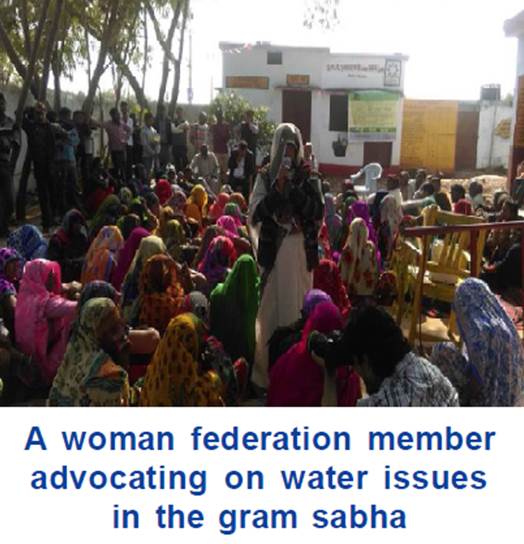|
Women in Rural
Bundelkhand G ender inequality exists at every social strata of the Indian society which pushes India to rank 97th on the gender related development index of 137 nations (Ref. Human Development Report, 2007). However, there are heartening stories of women empowerment from different corners of the country. Women in rural Bundelkhand in Central India, despite suffering under the social pressures of feudalism, domestic violence, lack of education and health problems like malnutrition, increased drudgery and repeated childbearing; are engaging themselves in direct and allied agricultural activities, running small shops, producing and selling handicraft products - thus generating additional income for the family and thereby bringing social change also. But due to women’s disproportionately low status in society, the entrepreneurial as well as leadership role of rural women has not been tapped into the development model of Bundelkhand. With the aim of empowering poor rural women to recognise themselves as pivotal players in shaping qualitative growth of Bundelkhand, two women federations have been formed. The Sahyogini Mahila Mandal (SMM) of Jhansi and Sankalp Swashakti Mahila Mandal (SSMM) of Tikamgarh have shown tremendous stewardship in last two years.In 2009-10, Development Alternatives formed about 300
Women Self Help Groups with the support from NABARD with the mission of
economic empowerment of women aimed at income generation and
self-reliance. Started initially with regular monthly savings and income
generating activities, these women groups after being registered into
Federations, gradually upgraded their role in influencing social
developmental processes through participating local governance,
demanding entitlements and obtaining competency in decision making. The
federation of Jhansi, SMM established itself as a pioneer in uniting and
sensitising the women SHG members of 25 villages of Jhansi to develop a
model of women leadership that leads to equitable and responsive
While the federation in Jhansi has flag shipped the social empowerment agenda, SSMM, another federation in Tikamgarh has taken effective leadership in empowering members of 50 WSHGs to emerge as an aggregated business enterprise model for vermin-composting. The members have been imparted training to demonstrate technologically modern, environmentally friendly and sustainable methods of livestock rearing and waste management. With 12 operational units in the centre, SSMM has set up a total of 102 community units to produce 600 tonnes of vermin-compost in a year with a revenue generation of Rs. 14.51 lakhs last year. The community aggregation model is successfully running and has resulted in an additional income of Rs. 1500 a month for an individual woman entrepreneur. With its uniqueness and branding as ‘Shakti’, the produce and the technology of vermin-composting are attracting many other entrepreneurs of Bundelkhand to adopt the same. Thus with proper exposure, education, capacity development and opportunity; women can bring positive socio-economic changes and catalyse the growth of the society towards sustainability proving the phrase - ‘The hand that rocks the cradle rules the world’ to be true. q Mahua Tripathy |
 local
development. In this effort, Development Alternatives has developed the
capacities of these women to emerge as local change agents to drive
local development to be more equitable and responsive to the needs of
the community. Some of the members have been trained to form a nukkad
natak team, named ‘Kashish’ (appeal for) carrying the agenda
of creating awareness amongst the community members for WASH behaviour
change as well as on the need and importance of participation in local
governance processes. Apart from this social mobilisation initiative,
SMM has established a ‘women led water supply management system’ in a
village near Jhansi to ensure safe drinking water at the doorstep of 350
households. The exemplary leadership of these federation members
motivated other women to change their role from homemakers to decision
makers as political representatives. This transformation is evident from
the increase in political participation in the recent Panchayat
elections in Badagaon and Babina blocks of Jhansi. There are 41 women
out of 118 seats of Gram Panchayat Pradhans (34.7%) (Ref. State
Election Commission, U.P).
local
development. In this effort, Development Alternatives has developed the
capacities of these women to emerge as local change agents to drive
local development to be more equitable and responsive to the needs of
the community. Some of the members have been trained to form a nukkad
natak team, named ‘Kashish’ (appeal for) carrying the agenda
of creating awareness amongst the community members for WASH behaviour
change as well as on the need and importance of participation in local
governance processes. Apart from this social mobilisation initiative,
SMM has established a ‘women led water supply management system’ in a
village near Jhansi to ensure safe drinking water at the doorstep of 350
households. The exemplary leadership of these federation members
motivated other women to change their role from homemakers to decision
makers as political representatives. This transformation is evident from
the increase in political participation in the recent Panchayat
elections in Badagaon and Babina blocks of Jhansi. There are 41 women
out of 118 seats of Gram Panchayat Pradhans (34.7%) (Ref. State
Election Commission, U.P).